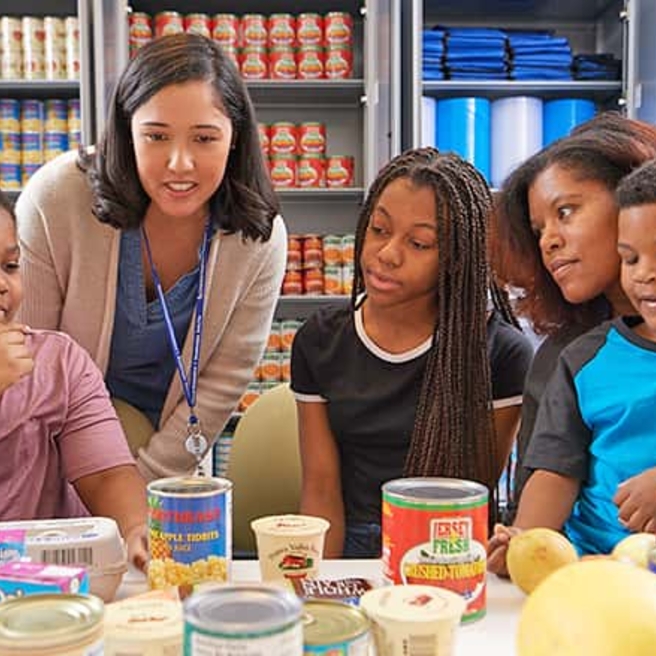Researchers at Children’s Hospital of Philadelphia (CHOP) found that most patients and their families who reported experiencing food insecurity benefitted from consistent delivery of fresh produce and prepared healthy meals post-hospitalization. The study, recently published in Pediatrics, underscores the need for hospital systems to partner with community-based organizations to address food insecurity throughout the United States.
Nearly 1 in 5 families with children in the U.S. are food insecure. A child’s hospitalization can exacerbate food insecurity, both during their hospital stay and after the child is discharged. Although some hospitals provide free or subsidized meals during hospitalization, few address food insecurity after families are discharged home. In 2018, CHOP launched a pediatric, hospital- and clinic-based food pharmacy to promote healthy nutrition and address food insecurity in the Philadelphia area. The Food Pharmacy originally began as a component of CHOP’s Healthy Weight Program — a multidisciplinary, comprehensive initiative that targets pediatric obesity. The Food Pharmacy has since expanded to serve children and families at several CHOP Care Network primary care clinics, and in 2023, the program began serving families following inpatient hospitalizations at CHOP.
The Food Pharmacy team determined it was important to provide families with ongoing support following discharge from the hospital. Families of hospitalized children experiencing food insecurity were offered a choice of 1 week of prepared meals, 6 months of monthly produce delivery, or both, after discharge. They aimed to assess program enrollment, understand family preferences and evaluate the program’s feasibility and acceptability.

“Addressing food insecurity is an urgent responsibility,” said Abbe Stern, BS, the food pharmacy manager at CHOP. “Every moment we delay, another child faces an empty plate. Our goal is to live in a world where no child is left malnourished.”
As part of the post-discharge initiative, which took place between July 2023 and May 2024, the team identified 120 eligible families and 71 (59%) enrolled. Fifty-five families (77%) chose both prepared meals and produce delivery, 13 (18%) chose prepared meals only and 3 (4%) chose produce delivery only. The program successfully delivered 6972 prepared meals and 348 boxes of produce over 10 months. Follow-up calls reached 41 (58%) of enrolled families, all of whom reported that the program met their acute food needs. Overall, CHOP received positive feedback about the program both from families and from health system-based community resource navigators.
“We aim to advocate for ongoing funding for food delivery for children and families experiencing food insecurity,” said Stern. “Partnering with local organizations for meal delivery ensures that funds are reinvested into the surrounding community, supporting employment and business development.”

To continue to facilitate food delivery for families experiencing food insecurity, researchers are looking into several potential revenue streams. These include CHOP’s community benefit spending, a proposed statewide Medicaid Section 1115 waiver that would provide grocery delivery to Medicaid-insured pregnant and postpartum individuals and their families, and the federally funded Special Supplemental Nutrition Program for Women, Infants, and Children (WIC) and Supplemental Nutrition Assistance Program (SNAP), which currently fund online grocery shopping and food delivery in some states.
The Inpatient Food Pharmacy pilot was supported by the Agency for Healthcare Research and Quality grant K08HS029396, the Oscar and Elsa Mayer Foundation, the Rite Aid Healthy Futures grant and funding from The GIANT Company. The funders had no role in the design or conduct of this study.
Bouchelle, et al. “Home Food Delivery to Address Food Insecurity Following Hospital Discharge.” Pediatrics. Online November 8, 2024. DOI: 10.1542/peds.2024-068249.
Featured in this article
Experts
Specialties & Programs
Researchers at Children’s Hospital of Philadelphia (CHOP) found that most patients and their families who reported experiencing food insecurity benefitted from consistent delivery of fresh produce and prepared healthy meals post-hospitalization. The study, recently published in Pediatrics, underscores the need for hospital systems to partner with community-based organizations to address food insecurity throughout the United States.
Nearly 1 in 5 families with children in the U.S. are food insecure. A child’s hospitalization can exacerbate food insecurity, both during their hospital stay and after the child is discharged. Although some hospitals provide free or subsidized meals during hospitalization, few address food insecurity after families are discharged home. In 2018, CHOP launched a pediatric, hospital- and clinic-based food pharmacy to promote healthy nutrition and address food insecurity in the Philadelphia area. The Food Pharmacy originally began as a component of CHOP’s Healthy Weight Program — a multidisciplinary, comprehensive initiative that targets pediatric obesity. The Food Pharmacy has since expanded to serve children and families at several CHOP Care Network primary care clinics, and in 2023, the program began serving families following inpatient hospitalizations at CHOP.
The Food Pharmacy team determined it was important to provide families with ongoing support following discharge from the hospital. Families of hospitalized children experiencing food insecurity were offered a choice of 1 week of prepared meals, 6 months of monthly produce delivery, or both, after discharge. They aimed to assess program enrollment, understand family preferences and evaluate the program’s feasibility and acceptability.

“Addressing food insecurity is an urgent responsibility,” said Abbe Stern, BS, the food pharmacy manager at CHOP. “Every moment we delay, another child faces an empty plate. Our goal is to live in a world where no child is left malnourished.”
As part of the post-discharge initiative, which took place between July 2023 and May 2024, the team identified 120 eligible families and 71 (59%) enrolled. Fifty-five families (77%) chose both prepared meals and produce delivery, 13 (18%) chose prepared meals only and 3 (4%) chose produce delivery only. The program successfully delivered 6972 prepared meals and 348 boxes of produce over 10 months. Follow-up calls reached 41 (58%) of enrolled families, all of whom reported that the program met their acute food needs. Overall, CHOP received positive feedback about the program both from families and from health system-based community resource navigators.
“We aim to advocate for ongoing funding for food delivery for children and families experiencing food insecurity,” said Stern. “Partnering with local organizations for meal delivery ensures that funds are reinvested into the surrounding community, supporting employment and business development.”

To continue to facilitate food delivery for families experiencing food insecurity, researchers are looking into several potential revenue streams. These include CHOP’s community benefit spending, a proposed statewide Medicaid Section 1115 waiver that would provide grocery delivery to Medicaid-insured pregnant and postpartum individuals and their families, and the federally funded Special Supplemental Nutrition Program for Women, Infants, and Children (WIC) and Supplemental Nutrition Assistance Program (SNAP), which currently fund online grocery shopping and food delivery in some states.
The Inpatient Food Pharmacy pilot was supported by the Agency for Healthcare Research and Quality grant K08HS029396, the Oscar and Elsa Mayer Foundation, the Rite Aid Healthy Futures grant and funding from The GIANT Company. The funders had no role in the design or conduct of this study.
Bouchelle, et al. “Home Food Delivery to Address Food Insecurity Following Hospital Discharge.” Pediatrics. Online November 8, 2024. DOI: 10.1542/peds.2024-068249.
Recommended reading
Food Pharmacy Is Just What the Doctor Ordered

CHOP’s Healthy Weight Food Pharmacy serves up nutritious groceries and health education to food-insecure families.
Contact us
Joey McCool Ryan
Health and Well-being Clinic